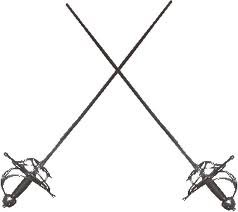“Put him in me book!”
BRYCE ON TOLERANCE
 During the 1952 classic movie, “The Quiet Man” (starring John Wayne), the antagonist is played by Victor McLaglen as Squire “Red” Will Danaher, a boisterous Irishman who tries to intimidate people through his physical presence. If you crossed him, you were placed on his “List,” which was maintained in a little black book by his assistant. If someone was placed on “The List” the Squire would not socialize or do business with that person until, through some miraculous stroke of fate, the person redeemed himself. I think we all have some sort of list we maintain. I know I do.
During the 1952 classic movie, “The Quiet Man” (starring John Wayne), the antagonist is played by Victor McLaglen as Squire “Red” Will Danaher, a boisterous Irishman who tries to intimidate people through his physical presence. If you crossed him, you were placed on his “List,” which was maintained in a little black book by his assistant. If someone was placed on “The List” the Squire would not socialize or do business with that person until, through some miraculous stroke of fate, the person redeemed himself. I think we all have some sort of list we maintain. I know I do.
There are unscrupulous people I simply do not want anything to do with, not even to shake their hand. If I know someone has committed some indiscretion or injustice, be it to myself or someone else I respect, I put them on “The List.” Translation: I want nothing to do with them. As for me, I have come across such people not only in business but also in the various organizations I belong to. Frankly, I have no time for someone who wishes to undermine people for political gamesmanship, or to line their pockets through treachery.
I know of a person who was unfairly suspended by a fraternal order even after 50 years of service. He was a person I held in high regard. He may have been prone to coarse language now and then, but he was a good person and you could take his word to the bank. Unfortunately, there was a rush to judgment by the powers of the order and he was never allowed to defend himself of the suspicious charges. Other members of the order wouldn’t come to his defense as they were in fear of being penalized themselves. Cowards. Consequently, he was suspended indefinitely. There are a lot of people in that order I have put on my list, and will not shake their hand. That was five years ago. Some people have said to me, “Tim, why don’t you just let it go? This cannot go on forever.” I replied, “What if that had been you? Would you have wanted me to just let it go?” They looked back at me blankly.
Shaking of a person’s hand is very symbolic. It means you like them and trust their judgement to do the right thing. Not shaking someone’s hand may seem innocuous, but try it sometime. By not shaking the person’s hand you are are saying, “I do not trust you as a person; you are on The List.”
For some reason, I have several restaurants on my list, a few with prominent national names. A couple of them are highbrow, some are franchises, and others are just simple restaurants. I placed them on my “List” either because the food or service was bad (or both), or there was some other faux pas made, such as an obnoxious hostess, waiter, or manager. I would give you the names of the restaurants in question, but that is immaterial at this time. Suffice it to say, they did something which earned them a prominent spot on my list. Some people suggest I am being too stubborn, that I should give them another chance. I tried this a couple of times and lived to regret it. They were still screw-ups and I regretted revisiting their establishment. Consequently, once they had been rightfully placed on my “List,” they stay there until such time as an act of God occurs, which is usually never.
Maybe we’re too tolerant and forgiving of an injustice. People seem to “forgive and forget” too easily. I believe this to be a serious flaw in the American character. I’m not sure everyone should maintain a “List,” but I would certainly like to see people develop a better memory of indiscretions. Maybe we wouldn’t repeat the same mistakes so often if we did.
Keep the Faith!
Note: All trademarks both marked and unmarked belong to their respective companies.
 Tim Bryce is a writer and the Managing Director of M&JB Investment Company (M&JB) of Palm Harbor, Florida and has over 30 years of experience in the management consulting field. He can be reached at timb001@phmainstreet.com
Tim Bryce is a writer and the Managing Director of M&JB Investment Company (M&JB) of Palm Harbor, Florida and has over 30 years of experience in the management consulting field. He can be reached at timb001@phmainstreet.com
For Tim’s columns, see:
timbryce.com
Like the article? TELL A FRIEND.
Copyright © 2013 by Tim Bryce. All rights reserved.
Listen to Tim on WJTN-AM (News Talk 1240) “The Town Square” with host John Siggins (Mon, Wed, Fri, 12:30-3:00pm Eastern), KGAB-AM 650 “The Morning Zone” with host Dave Chaffin (weekdays, 6:00-10:00am Mountain), and KIT-AM 1280 in Yakima, Washington “The Morning News” with hosts Lance Tormey & Brian Teegarden (weekdays. 6:00-9:00am Pacific). Or tune-in to Tim’s channel on YouTube.
(Click for AUDIO VERSION)
To use this segment in a Radio broadcast or Podcast, send TIM a request.




 While visiting with some high school teacher friends, I asked how American History was being taught today. I always had a fondness for history, even if the teacher was boring. I particularly enjoyed learning about the American Civil War, and the events leading up to it. I saw it as an epoch event which defined the American character. The aftermath of the Civil War was also interesting including carpetbagging and the corruption of the Grant administration. Most of what I learned came from History and Social Studies classes I took from elementary school to high school. I didn’t take any formal history classes in college, but learned a lot through the other courses I took. To accent the meaning of a subject, the professors often found it necessary to describe its historical roots.
While visiting with some high school teacher friends, I asked how American History was being taught today. I always had a fondness for history, even if the teacher was boring. I particularly enjoyed learning about the American Civil War, and the events leading up to it. I saw it as an epoch event which defined the American character. The aftermath of the Civil War was also interesting including carpetbagging and the corruption of the Grant administration. Most of what I learned came from History and Social Studies classes I took from elementary school to high school. I didn’t take any formal history classes in college, but learned a lot through the other courses I took. To accent the meaning of a subject, the professors often found it necessary to describe its historical roots.
 As you grow older you begin to notice small changes in your life, such as how advertisers no longer market to your age group, or how the entertainment field no longer caters to you. Consequently, you begin to find it difficult to find anything of interest on television or at the movies. Instead, you begin to read more, watch the news and perhaps some reruns before calling it a night. Your sense of fashion and style changes, as does your purchasing decisions. It finally becomes crystal clear that everything is being geared to a younger generation, not yours. In other words, you feel the world passing you by, which I can only presume to be a natural phenomenon.
As you grow older you begin to notice small changes in your life, such as how advertisers no longer market to your age group, or how the entertainment field no longer caters to you. Consequently, you begin to find it difficult to find anything of interest on television or at the movies. Instead, you begin to read more, watch the news and perhaps some reruns before calling it a night. Your sense of fashion and style changes, as does your purchasing decisions. It finally becomes crystal clear that everything is being geared to a younger generation, not yours. In other words, you feel the world passing you by, which I can only presume to be a natural phenomenon.
 It is no secret Masonic membership is in decline. According to the MSA, membership has gone down a whopping 68% since its high in 1959. With each passing year, fewer young men join to replace those who departed due to death. There is also no abating the number of members being suspended for non-payment of dues. A lot of people are baffled by these trends including our leaders who are at a loss as to what to do. One day classes and amnesty programs have proven ineffective. To me, the decline is indicative of an identity crisis as to who and what we are as Masons. There are those who become a Mason as nothing more than some sort of badge of honor, to make business connections, or perhaps to move on to an affiliated body, such as the Shrine. Then there are those who aspire to seek further light and seek to improve themselves in accordance with the basic tenets of Freemasonry: friendship, morality, and Brotherly love. To these people, Freemasonry is viewed as an on-going process of development as opposed to a one time proposition. The disparity between the two interpretations leads to political problems within Freemasonry and harmony suffers.
It is no secret Masonic membership is in decline. According to the MSA, membership has gone down a whopping 68% since its high in 1959. With each passing year, fewer young men join to replace those who departed due to death. There is also no abating the number of members being suspended for non-payment of dues. A lot of people are baffled by these trends including our leaders who are at a loss as to what to do. One day classes and amnesty programs have proven ineffective. To me, the decline is indicative of an identity crisis as to who and what we are as Masons. There are those who become a Mason as nothing more than some sort of badge of honor, to make business connections, or perhaps to move on to an affiliated body, such as the Shrine. Then there are those who aspire to seek further light and seek to improve themselves in accordance with the basic tenets of Freemasonry: friendship, morality, and Brotherly love. To these people, Freemasonry is viewed as an on-going process of development as opposed to a one time proposition. The disparity between the two interpretations leads to political problems within Freemasonry and harmony suffers.
 It’s interesting the types of objects we collect and never seem to throw away. I’m not talking about sentimental things like photographs, just the general brik a brak we are more inclined to keep instead of discarding. With me, its cigar boxes and coffee cans. I’ve used them to store everything from nails and other hardware, to tickets, baseball cards, and other trinkets. I think of them as handy storage units and, as such, hate to throw them away, even if I have an ample supply of them. Most of the time I’ll ask friends and colleagues if they want them, but most decline. Inevitably, it is with deep regret that I finally decide to throw them in the garbage. What a waste.
It’s interesting the types of objects we collect and never seem to throw away. I’m not talking about sentimental things like photographs, just the general brik a brak we are more inclined to keep instead of discarding. With me, its cigar boxes and coffee cans. I’ve used them to store everything from nails and other hardware, to tickets, baseball cards, and other trinkets. I think of them as handy storage units and, as such, hate to throw them away, even if I have an ample supply of them. Most of the time I’ll ask friends and colleagues if they want them, but most decline. Inevitably, it is with deep regret that I finally decide to throw them in the garbage. What a waste.
 I took some time off during the Memorial Day weekend and escaped to the beach. I guess I’m like just about anyone in that I rarely take advantage of the scenery in your own backyard. It’s been a while since I’ve been to the beach and I found the rhythm of the waves in the morning tranquil and somewhat therapeutic. However, I had forgotten about all of the pollution on the beach, eye pollution that is. I was amazed how many women of all sizes and shapes wore a bikini and probably 99% of those I saw shouldn’t. Please don’t get me wrong, there is certainly nothing wrong with an attractive woman wearing a bikini, but most of what I saw defied belief. Sure, if you’ve got it flaunt it, but if you haven’t got it, forget it. The ship has sailed and it’s time to put on a little more canvas in the rigging.
I took some time off during the Memorial Day weekend and escaped to the beach. I guess I’m like just about anyone in that I rarely take advantage of the scenery in your own backyard. It’s been a while since I’ve been to the beach and I found the rhythm of the waves in the morning tranquil and somewhat therapeutic. However, I had forgotten about all of the pollution on the beach, eye pollution that is. I was amazed how many women of all sizes and shapes wore a bikini and probably 99% of those I saw shouldn’t. Please don’t get me wrong, there is certainly nothing wrong with an attractive woman wearing a bikini, but most of what I saw defied belief. Sure, if you’ve got it flaunt it, but if you haven’t got it, forget it. The ship has sailed and it’s time to put on a little more canvas in the rigging.
 I think Americans have a problem taking vacations. Although most of us feel lucky to take a week off or a few days here and there, it’s rare for Americans to take vacations like our European or Australian counterparts who may take as much as a month off at a time. Sure, we enjoy some time off to recoup from work, but I think the problem here is that Americans don’t know how to relax. Whereas others take the time to study the culture of a different locale, Americans rush from one spot to another snapping photos along the way. If you’ve ever seen the movie,
I think Americans have a problem taking vacations. Although most of us feel lucky to take a week off or a few days here and there, it’s rare for Americans to take vacations like our European or Australian counterparts who may take as much as a month off at a time. Sure, we enjoy some time off to recoup from work, but I think the problem here is that Americans don’t know how to relax. Whereas others take the time to study the culture of a different locale, Americans rush from one spot to another snapping photos along the way. If you’ve ever seen the movie, 
 When we join a new company, we’re all hoping for a fresh start and clean slate. The last thing we want is to get embroiled in political intrigue, regardless of how petty it might seem. Most of us just want to do our work and move along with our lives. Even if this were so, which is rarely the case, we must still deal with “political correctness” as defined by society; we have to recognize certain protocols in our mannerisms, language, and conduct. So, even before we get started in a new job, we have to recognize there is going to be some form of politics, like it or not. I remember visiting a manufacturing company in the Midwest where a Vice President proudly said to me, “You’ll like this place Tim, there’s no politics here whatsoever.” And I think he firmly believed it too. In reality, they had more cutthroat politics than I had ever seen before.
When we join a new company, we’re all hoping for a fresh start and clean slate. The last thing we want is to get embroiled in political intrigue, regardless of how petty it might seem. Most of us just want to do our work and move along with our lives. Even if this were so, which is rarely the case, we must still deal with “political correctness” as defined by society; we have to recognize certain protocols in our mannerisms, language, and conduct. So, even before we get started in a new job, we have to recognize there is going to be some form of politics, like it or not. I remember visiting a manufacturing company in the Midwest where a Vice President proudly said to me, “You’ll like this place Tim, there’s no politics here whatsoever.” And I think he firmly believed it too. In reality, they had more cutthroat politics than I had ever seen before.